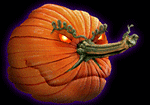
Zombos Says: Very Good
While I readily admit that some hotel rooms I've spent time in were murder, none of them ever tried to kill me. Unfortunately for writer Mike Enslin (John Cusack), room 1408 in the Dolphin Hotel punches his number with a vengeance. With an ominous song blaring from the one-hour clock-radio heralding doom, hot and cold running ghosts, and concierge service to die from, he's in quite a pickle; but, after all, he did insist on spending the night in it.
What is it about writers? Especially depressed ones that have lost a loved one and search for some truth behind that long dark curtain of the night? Enslin's on a quest to find just one ghost, one real moan, one real hint of life beyond the pall. He's so obsessed, he's lost track of his own life, and wife, while spending night after fruitless night searching for hope shining off a ghostly glimmer. I feel for him. I watch Ghost Hunters on the Sci-Fi Channel again and again, hoping for just that moment, that one shining, incontrovertible bit of proof there's more to death than meets the unseeing eye. If and when that moment comes, I hope it doesn't try to kill me, too.
That's the mystery of room 1408: what is the malevolent force residing in that room, driving people to mutilate and kill themselves? In true J-horror fashion, we never learn the answer, but the question is well-illustrated in psychological, not gory, terms, driving Enslin to fight both the room's and his own inner demons. And they keep coming on strong, giving him little respite nor a good night's sleep.
The postcard warning him to stay out of room 1408 is too enticing for him, so instead of heeding the warning, he heads to New York City to the Dolphin Hotel, to insist on spending the night in a room that's killed fifty-six other guests—with one drowned in his chicken soup. The hotel manager, Olin (Samuel L. Jackson), sums it up best: "It's an evil f**cking room."
 Not even Olin's detailed scrapbook of news clippings and death photographs convinces Enslin to forgo 1408 and spend the night in the penthouse suite; but it does provide for a chilling, tension-building walk as Enslin peruses it, page by gruesome-death page, during his walk from the elevator to 1408. Once he enters the room, and nothing immediately jumps out of the closet, he relaxes a bit and pops open the bottle of high-priced liquor Olin tried to bribe him with; but that lets the spirits out, metaphorically speaking.
Not even Olin's detailed scrapbook of news clippings and death photographs convinces Enslin to forgo 1408 and spend the night in the penthouse suite; but it does provide for a chilling, tension-building walk as Enslin peruses it, page by gruesome-death page, during his walk from the elevator to 1408. Once he enters the room, and nothing immediately jumps out of the closet, he relaxes a bit and pops open the bottle of high-priced liquor Olin tried to bribe him with; but that lets the spirits out, metaphorically speaking.
And once they're out, hell starts to follow as the room's evil entity makes its presence known by blaring "We've Only Just Begun" by the Carpenters, and fooling around with his turn-down service. When he can't get out of the room, now that he realizes it really wasn't a good idea to enter it in the first place, his hand-held recorder becomes more than a voice-recorder; it allows him to vent his fear, his anger, and his thoughts, giving us a front-row seat to watch his mental state go from cocky to scared sh*tless in no time flat.
As the room's temperature shifts from hot to arctic, and the paintings on the wall take on a Night Gallery-style life of their own, Enslin's fear turns to rage as he fights the good fight to leave the room on his terms, not splattered on the pavement below, or, like one previous guest, stitching up his own, self-inflicted throat slice from ear to ear.
 Cusack handles the three-sixty mood swing with verve, and his disoriented performance brings us into the room alongside him. Horror is best when served alone, and he proves it by keeping us asking if and how he'll find the way out. Without lavish gore, director Mikael Håfström increases the shocks by first showing little, disquieting events that rattle Enslin's composure, then increases the assault on his nerves with CGI-enhanced calamities that build in intensity. Gabriel Yared's effective music is mixed in with harsh, discordant sounds and the pleasant-sounding, but tauntingly malign voice on the other end of the telephone, promising more unpleasant room service to come. All of this plays on our nerves, as well as Enslin's.
Cusack handles the three-sixty mood swing with verve, and his disoriented performance brings us into the room alongside him. Horror is best when served alone, and he proves it by keeping us asking if and how he'll find the way out. Without lavish gore, director Mikael Håfström increases the shocks by first showing little, disquieting events that rattle Enslin's composure, then increases the assault on his nerves with CGI-enhanced calamities that build in intensity. Gabriel Yared's effective music is mixed in with harsh, discordant sounds and the pleasant-sounding, but tauntingly malign voice on the other end of the telephone, promising more unpleasant room service to come. All of this plays on our nerves, as well as Enslin's.
Never has room service been this bad, or this much fun. In a summer of horror that can too easily become mired in uninspired by-the-body-count nihilistic splatter, 1408 goes back to the old school for its scares. And it works.
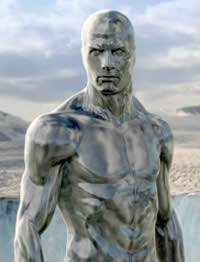 Instead, what we get is more standard chuckles between Ben and Johnny, Susan's concern over how their celebrity is ruining her marriage and family plans, along with another one of her "Oh, damn, I'm nude again in public" scenes, and simplistic children's twaddle that completely erases the grandeur, nobility, and greater depth depicted in the comic book for gosh sakes. Digest that last sentence again: the 1960's comic book storyline had more depth than this movie.
Instead, what we get is more standard chuckles between Ben and Johnny, Susan's concern over how their celebrity is ruining her marriage and family plans, along with another one of her "Oh, damn, I'm nude again in public" scenes, and simplistic children's twaddle that completely erases the grandeur, nobility, and greater depth depicted in the comic book for gosh sakes. Digest that last sentence again: the 1960's comic book storyline had more depth than this movie.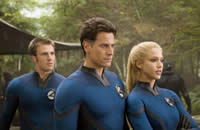 Apparently, what's more appropriate is writing down to the audience by relying on the usual funny banter and sight gags, with by-the-script Fantastic Four family squabbling. Hello, anybody notice Armageddon approaching yet? While Reed does the disco hustle at his bachelor party, and Johnny dons his Keebler-endorsed blue suit, whatever happened to a little suspense? Except for that brief planet explosion in the opening, more time is spent away from the impending doom than on it. I got it that being a celebrity is annoying, but hey, so is having your planet chewed on like rock candy while you're still standing on it.
Apparently, what's more appropriate is writing down to the audience by relying on the usual funny banter and sight gags, with by-the-script Fantastic Four family squabbling. Hello, anybody notice Armageddon approaching yet? While Reed does the disco hustle at his bachelor party, and Johnny dons his Keebler-endorsed blue suit, whatever happened to a little suspense? Except for that brief planet explosion in the opening, more time is spent away from the impending doom than on it. I got it that being a celebrity is annoying, but hey, so is having your planet chewed on like rock candy while you're still standing on it.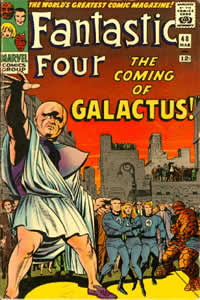 At this point, you're probably saying to yourself, man, a purple-dressed and toga-robed duo of giants would have been laughable on screen. Perhaps, but you bought everything else up till now, right? You're okay with a flaming man, an invisible woman, a rubber guy, and an orange rock pile with a head, not to mention the Alcoa Reynolds Wrap riding the sky on a silver surfboard without any swim trunks. At least their appearance in the film would have made the story more—ironically—human and visually interesting.
At this point, you're probably saying to yourself, man, a purple-dressed and toga-robed duo of giants would have been laughable on screen. Perhaps, but you bought everything else up till now, right? You're okay with a flaming man, an invisible woman, a rubber guy, and an orange rock pile with a head, not to mention the Alcoa Reynolds Wrap riding the sky on a silver surfboard without any swim trunks. At least their appearance in the film would have made the story more—ironically—human and visually interesting.

 Chindi spotted this unbelievable article regarding another instance of stupid parents doing stupid things; like taking kids to see Hostel: Part II, a film that has graphic castration, decapitation, cannibalism, vivisection, and really really rude townspeople.
Chindi spotted this unbelievable article regarding another instance of stupid parents doing stupid things; like taking kids to see Hostel: Part II, a film that has graphic castration, decapitation, cannibalism, vivisection, and really really rude townspeople.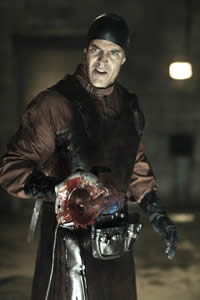
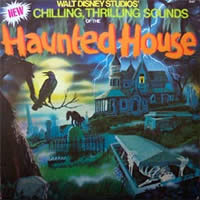 A few places. Firstly, like quite a few American children, I had several Halloween records when I was young, including Bobby "Boris" Pickett's The Monster Mash and several collections of Halloween sound effects. As an adult, I started tracking down albums like this to compile Halloween mix tapes for my friends, and began to realize that an enormous amount of music had been written with supernatural themes. That's when I began collecting in earnest.
A few places. Firstly, like quite a few American children, I had several Halloween records when I was young, including Bobby "Boris" Pickett's The Monster Mash and several collections of Halloween sound effects. As an adult, I started tracking down albums like this to compile Halloween mix tapes for my friends, and began to realize that an enormous amount of music had been written with supernatural themes. That's when I began collecting in earnest.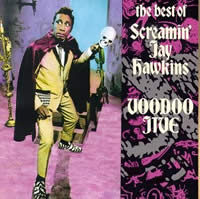 At the same time, I also like songs that are just deliberately ridiculous. I'm a big fan of Nervous Norvus, for example. His be-bopping, ukulele-backed songs are just great, and he has such an oddly morbid sensibility. In Transfusion, for example, he sings of an endless series of car crashes and blood transfusions, while in The Fang he takes on the role of a zoot-suited space alien. And I have been listening to Screamin' Jay Hawkins since I was a boy, and have yet to grow tired of him.
At the same time, I also like songs that are just deliberately ridiculous. I'm a big fan of Nervous Norvus, for example. His be-bopping, ukulele-backed songs are just great, and he has such an oddly morbid sensibility. In Transfusion, for example, he sings of an endless series of car crashes and blood transfusions, while in The Fang he takes on the role of a zoot-suited space alien. And I have been listening to Screamin' Jay Hawkins since I was a boy, and have yet to grow tired of him. 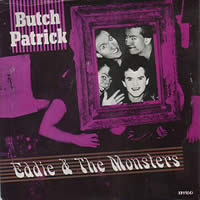 Butch Patrick, who played Eddie Munster on The Munsters, released a 45rpm single called Whatever Happened to Eddie in the 80s, consisting of him singing over a new wave version of the Munsters, and basically updating people as to his activities. There was a point when you could hire him to appear at parties in his Eddie Munster outfit, despite the fact that he was now an adult—Ben Stiller parodied this once, on Saturday Night Live, if I remember correctly. The flip side of Whatever Happened to Eddie is actually a terrific song called Little Monsters, somewhat reminiscent of the music of Thomas Dolby.
Butch Patrick, who played Eddie Munster on The Munsters, released a 45rpm single called Whatever Happened to Eddie in the 80s, consisting of him singing over a new wave version of the Munsters, and basically updating people as to his activities. There was a point when you could hire him to appear at parties in his Eddie Munster outfit, despite the fact that he was now an adult—Ben Stiller parodied this once, on Saturday Night Live, if I remember correctly. The flip side of Whatever Happened to Eddie is actually a terrific song called Little Monsters, somewhat reminiscent of the music of Thomas Dolby.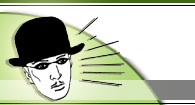 Dr. Mysterian is a pseudonym, borrowed from the band name Question Mark and the Mysterians. The actual Dr. Mysterian is a writer and editor currently living in Minneapolis, formerly of New Orleans, who writes weekly predictions of the future, directly inspired by fraud psychic Criswell, which can be found in the pages of the Omaha Weekly. The official story is that Dr. Mysterian was in a freak accident that gave him the power to forecast the future, including seeing the exact time of his own death; obviously, some of the details of Dr. Mysterian's life are exaggerated or fabricated to protect his true identity.
Dr. Mysterian is a pseudonym, borrowed from the band name Question Mark and the Mysterians. The actual Dr. Mysterian is a writer and editor currently living in Minneapolis, formerly of New Orleans, who writes weekly predictions of the future, directly inspired by fraud psychic Criswell, which can be found in the pages of the Omaha Weekly. The official story is that Dr. Mysterian was in a freak accident that gave him the power to forecast the future, including seeing the exact time of his own death; obviously, some of the details of Dr. Mysterian's life are exaggerated or fabricated to protect his true identity. Zombos Says: Good
Zombos Says: Good FBI agent Flynn unloads a can of whoop ass on the thugs, and before you can say snakes on a plane, we're at the airport. It's at this point I realize this film is cheesy good. Melt in your mouth damn good. The script is simple, direct, and filled with simple and direct dialog, which is sometimes witty, sometimes trite, but always fun. From the yellowish-brown tinting of the film, to the 1970's style of direction and characterization, this is a vitamin B-12 kind of B-movie.
FBI agent Flynn unloads a can of whoop ass on the thugs, and before you can say snakes on a plane, we're at the airport. It's at this point I realize this film is cheesy good. Melt in your mouth damn good. The script is simple, direct, and filled with simple and direct dialog, which is sometimes witty, sometimes trite, but always fun. From the yellowish-brown tinting of the film, to the 1970's style of direction and characterization, this is a vitamin B-12 kind of B-movie. The audience counted down the seconds on the explosive timer as the digits dropped to zero. The crate breaks open and soon the little and big nasties are crawling everywhere and wreaking havoc.
The audience counted down the seconds on the explosive timer as the digits dropped to zero. The crate breaks open and soon the little and big nasties are crawling everywhere and wreaking havoc. Zombos Says: Fair
Zombos Says: Fair
